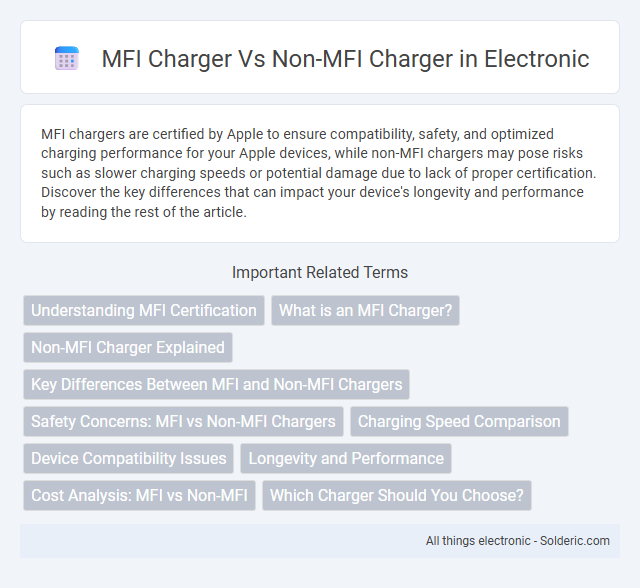MFI chargers are certified by Apple to ensure compatibility, safety, and optimized charging performance for your Apple devices, while non-MFI chargers may pose risks such as slower charging speeds or potential damage due to lack of proper certification. Discover the key differences that can impact your device's longevity and performance by reading the rest of the article.
Comparison Table
| Feature | MFI Charger | Non-MFI Charger |
|---|---|---|
| Certification | Apple MFi certified | No Apple certification |
| Compatibility | Guaranteed full compatibility with Apple devices | May have limited or no Apple device compatibility |
| Charging Safety | Built-in safeguards against overheating and overcharging | Varies; higher risk of damage or safety issues |
| Charging Speed | Optimized for efficient fast charging on Apple devices | Inconsistent charging speeds, potential slow or unstable charge |
| Durability | Higher quality materials and construction | Lower quality, prone to wear and failure |
| Data Transfer | Supports reliable data syncing with Apple devices | Limited or no support for reliable data transfer |
| Price | Generally higher due to certification and quality | Typically cheaper but with trade-offs in quality and safety |
Understanding MFI Certification
MFI certification ensures that your charger meets Apple's strict performance and safety standards, providing compatibility with iPhones, iPads, and other Apple devices. Non-MFI chargers lack this certification, which can lead to charging inefficiencies, potential device damage, or error messages. Choosing an MFI charger guarantees reliable charging and protection for your valuable Apple products.
What is an MFI Charger?
An MFI charger is a charging device certified under Apple's MFI (Made for iPhone/iPad) program, ensuring compatibility, safety, and reliable performance with Apple devices. These chargers incorporate an authentic Apple chip that communicates with iPhones or iPads to optimize charging and prevent errors or damage. Non-MFI chargers lack this certification and may pose risks like slower charging speeds, device incompatibility, or potential harm due to unregulated power delivery.
Non-MFI Charger Explained
Non-MFI chargers lack Apple's certification, meaning they do not meet the strict safety and performance standards required for iPhones and other Apple devices. Using a non-MFI charger can result in slower charging speeds, potential damage to your battery, and even risks of overheating or electrical failure. Ensuring your charger is MFI-certified guarantees compatibility and protects your device's longevity.
Key Differences Between MFI and Non-MFI Chargers
MFI chargers are certified by Apple to meet strict performance and safety standards, ensuring compatibility and optimal charging for Apple devices. Non-MFI chargers lack this certification, which can lead to slower charging speeds, potential device damage, or connectivity issues. Choosing an MFI charger protects your investment by guaranteeing reliable, efficient power delivery and device recognition.
Safety Concerns: MFI vs Non-MFI Chargers
MFI chargers undergo rigorous Apple certification to ensure compliance with safety and performance standards, significantly reducing risks of overheating, short circuits, and device damage. Non-MFI chargers often lack this certification, posing potential hazards such as electrical faults and inconsistent power delivery. Using an MFI charger protects your device by guaranteeing safe and reliable charging according to Apple's stringent guidelines.
Charging Speed Comparison
MFI chargers utilize certified Apple protocols that optimize power output, resulting in faster and more efficient charging for your Apple devices compared to non-MFI chargers. Non-MFI chargers often lack proper communication with the device, leading to slower charging speeds and potential power inconsistencies. Choosing an MFI charger ensures your device receives the correct voltage and current, maximizing charging speed and protecting battery health.
Device Compatibility Issues
MFI chargers are certified by Apple to ensure seamless compatibility with iPhones, iPads, and other Apple devices, reducing the risk of connection errors or device malfunctions. Non-MFI chargers may cause compatibility issues such as slower charging speeds, device warnings, or inability to charge due to lack of proper certification. Using an MFI charger protects your device's hardware and ensures reliable performance, avoiding potential damage caused by uncertified accessories.
Longevity and Performance
MFI chargers, certified by Apple, ensure optimal longevity and consistent performance by meeting strict quality standards, preventing overheating and device damage. Non-MFI chargers often lack these certifications, which can lead to reduced charging efficiency, faster wear on your device's battery, and potential safety risks. Choosing an MFI charger safeguards your device's charging health and maintains peak performance over time.
Cost Analysis: MFI vs Non-MFI
MFI chargers typically cost 20-40% more than non-MFI chargers due to Apple's certification fees and stringent quality standards, which ensure device compatibility and safety. Non-MFI chargers, while cheaper and widely available, often lack Apple's quality assurance, increasing the risk of device damage or reduced charging efficiency. Investing in MFI-certified chargers provides long-term value by preventing potential costs associated with device malfunctions or battery degradation.
Which Charger Should You Choose?
Choosing an MFI charger ensures compatibility, safety, and optimal charging speeds for Apple devices due to certification by Apple's Made for iPhone program. Non-MFI chargers may offer cheaper alternatives but often lack consistent performance, risk device damage, or fail to support advanced features like fast charging. Prioritizing an MFI charger helps maintain device longevity and ensures a reliable power supply tailored to Apple's specifications.
MFI charger vs non-MFI charger Infographic

 solderic.com
solderic.com